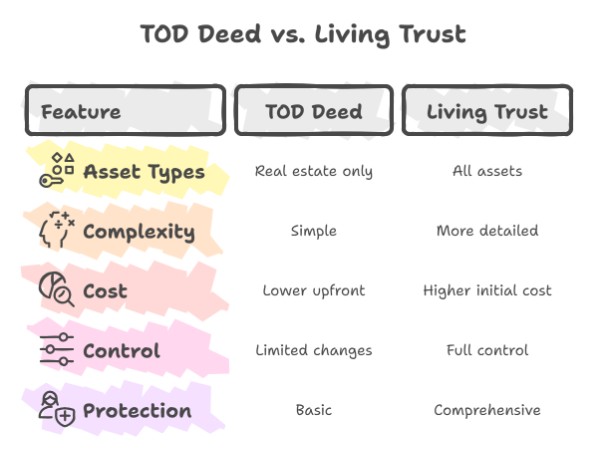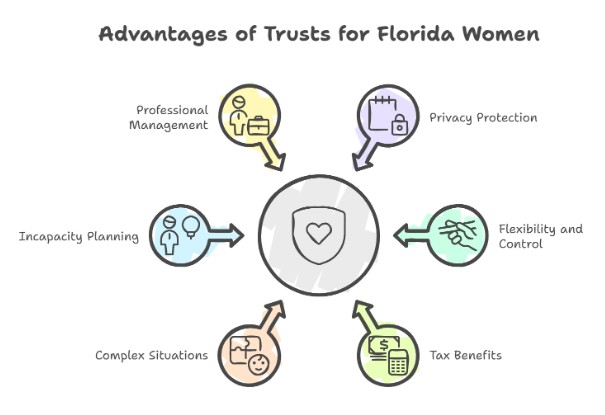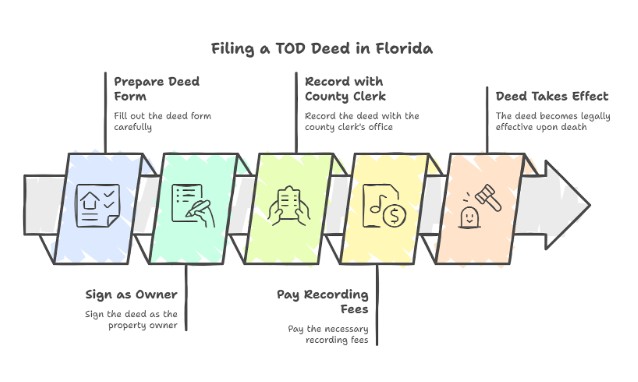

Originally published: August 2025 | Reviewed by Mary Conte
Florida women are stepping up when it comes to estate planning. Transfer on Death (TOD) deeds are quickly becoming the favorite way to dodge probate headaches.
These documents allow property to pass directly to chosen beneficiaries without involving the courts. That means women have a greater say in what happens to their financial legacy.
TOD deeds give Florida women a faster, cheaper alternative to traditional trusts—and they keep full control of their property while they’re alive.
Unlike those trust setups that can feel like a maze, TOD deeds are quick to set up and easy to change if life throws a curveball.
That flexibility really matters for women juggling careers, families, and finances. They need estate planning solutions that actually fit their busy lives.
Still, TOD deeds aren’t a magic fix for every situation. Some women discover too late that their estate plan requires more protection than these simple documents provide.
Knowing when TOD deeds shine and when they fall short helps Florida women make more informed choices about protecting their assets and caring for loved ones.

Florida women are picking Lady Bird deeds to keep independence over property decisions.
These deeds enable them to stay in control during their lifetime and ensure a smooth transfer to their beneficiaries.
Key Control Benefits:
Many women appreciate how Lady Bird deeds automatically transfer property to beneficiaries, eliminating the need for a judge’s involvement. That brings real peace of mind.
Flexibility stands out, especially for women navigating complex family situations. They can tweak their plans as life changes, and they don’t have to start from scratch with new legal paperwork.
Florida estate planning feels simpler with these tools. Women worry less about their families getting stuck in a long probate process.
Why Women Choose This Option:
The Enhanced Life Estate Deed provides Medicaid protection while still allowing women to retain property rights.
That combo is a significant draw, especially when planning for potential healthcare needs in the future.
With these deeds, women feel empowered to make their own choices. They protect what they’ve built and keep the final say on their property, right up to the end.
A Transfer on Death (TOD) deed lets property owners transfer real estate to beneficiaries after death without going through probate. Florida law covers TOD deeds under Chapter 732.
How TOD Deeds Function:
To set up a TOD deed, the property owner needs to follow a few steps:
| Requirement | Details |
| Written Form | Must be properly drafted with a legal description |
| Witnesses | Two witnesses required |
| Notarization | Must be notarized |
| Recording | Filed in county records before death |
The deed has to identify the property and name the beneficiary clearly. Recording the deed before death is a must, or it won’t count.
TOD deeds work similarly to enhanced life estate deeds (also known as Lady Bird deeds). Both skip probate and allow owners to retain control while they’re alive.
However, changing beneficiaries on a TOD deed can become complicated once it has been recorded. Lady Bird deeds make that part easier.
The property owner still has the option to sell, mortgage, or change the property up until the end.
Thinking about using a TOD deed to protect your Florida home? Conte Mollenhauer Law helps women create clean, legally sound transfers. Contact us to start your plan today.
If you’re ready to get started, call us now!

Florida women face some tough choices when picking between TOD deeds and trusts for estate planning. Both help avoid probate, but they aren’t the same animal.
A revocable living trust gives more thorough asset protection than a TOD deed. Women can put all kinds of assets in a living trust: real estate, bank accounts, investments—you name it.
TOD deeds only handle property transfer for real estate. They’re perfect for women with just one home who want a simple way to avoid probate. Still, most lawyers tend to favor living trusts for a more comprehensive plan.
Key Differences:
| Feature | TOD Deed | Living Trust |
| Asset types | Real estate only | All assets |
| Complexity | Simple | More detailed |
| Cost | Lower upfront | Higher initial cost |
| Control | Limited changes | Full control |
| Protection | Basic | Comprehensive |
A living trust makes changes easier than a TOD deed. Women can update beneficiaries, add assets, or modify terms without having to start over.
TOD deeds are most effective for women with simple estates and a limited number of assets. They’re a quick fix if the main asset is a home.
Living trusts are often more suitable for women with complex financial situations. They offer more flexibility and stronger asset protection as things grow.
TOD deeds skip probate, but they can bring surprises that trip people up. Some of these issues can really hurt families, sometimes in ways you just don’t see coming.
TOD deeds only cover the property listed in the document. Everything else still goes through probate, allowing families to deal with both TOD transfers and probate costs.
Florida can still go after property transferred by a TOD deed to recover Medicaid costs. The state might claim the property to pay off medical bills, even if probate wasn’t needed.
TOD deeds don’t shield property from creditors. Creditors can pursue the property after transfer, whereas probate at least imposes a time limit on claims.
Beneficiaries may be subject to unexpected capital gains taxes. The property transfer can trigger tax issues, so it’s smart to be aware of these costs ahead of time.
TOD deeds don’t allow you to set conditions, such as age limits, for beneficiaries. Young people could get valuable property before they’re ready, and there’s no way to add extra protection.
When there are multiple beneficiaries, they all become co-owners. That can spark fights over selling or managing the property, and TOD deeds don’t provide any tools for resolving disputes.

TOD deeds are straightforward, but trusts offer significant advantages for Florida women considering their future.
Trusts maintain privacy and avoid probate, whereas TOD deeds become a public record. That privacy can be a relief for families who want to keep their financial affairs private.
Trusts enable women to establish inheritance rules and safeguard assets in the event that beneficiaries face divorce, debt, or poor financial management.
Irrevocable trusts can help cut taxes and protect assets from future creditors. That matters a great deal for larger estates.
Women with multiple properties, blended families, or minor children often benefit more from a trust. TOD deeds just can’t handle all that complexity.
Trusts work in conjunction with power of attorney documents to manage affairs if someone loses the ability to make decisions. TOD deeds don’t cover that ground.
Trusts let you name professional trustees to handle tricky assets. That’s a lifesaver if family members aren’t financially savvy or live far away.
The extra paperwork and legal costs might be a pain, but they often pay off with better protection and peace of mind for Florida families.
Not sure whether a trust or TOD deed fits your life best? Conte Mollenhauer Law simplifies estate decisions for Florida women. Schedule your custom review with us now.
If you’re ready to get started, call us now!

Filing a TOD deed correctly protects women’s property interests. It also helps transfers happen smoothly.
Florida’s Transfer-on-Death deed requirements show up in Chapter 732 of the Florida Statutes.
Essential Requirements:
The deed needs to describe the real property clearly. Owners should use the exact legal description from their current deed; no shortcuts are allowed here.
Filing Process:
Florida TOD deeds don’t need notarization or witnesses. Still, you can’t skip proper execution if you want it to be valid.
Common Filing Mistakes to Avoid:
If you’re worried about privacy protection, TOD deeds can help you avoid public probate. The transfer occurs automatically upon death, with no court involvement.
An estate planning attorney can look over your deed before you file it. They’ll check for compliance with Florida’s rules and assist with more complex incapacity planning needs.
Anyone who owns Florida real estate can set up a TOD deed, regardless of marital status.
You can revoke the deed anytime while you’re alive, so you’ve got some flexibility if life throws you a curveball.
Once you record the completed deed with the county, it takes legal effect at the owner’s death.
Blended families run into unique challenges when it comes to estate planning in Florida.
Traditional estate planning tends to assume simple family trees, but blended families are rarely that straightforward.
The homestead exemption brings its own set of rules for your main residence. Typically, the surviving spouse receives the homestead, while children from previous marriages retain a remainder interest.
That setup can mean stepchildren get left out of the family home. Second homes don’t get homestead protection, so they go through standard probate unless you plan ahead.
| Option | Probate Required | Flexibility | Medicaid Impact |
| TOD Deed | No | Limited changes | Potential issues |
| Joint Tenants | No | Cannot change alone | May affect eligibility |
| Revocable Trust | No | High flexibility | Better protection |
Medicaid Planning Concerns
TOD deeds can complicate Medicaid eligibility. The owner retains full control while alive, which may impact asset calculations.
A revocable trust typically provides you with more options for protecting assets and maintaining control.
Blended families must navigate a delicate balance between caring for their current spouse and ensuring that children from a prior marriage receive their fair share.
Some use a life tenant arrangement so that a spouse can live in the home, but the children still inherit later.
Florida’s intestate succession laws may not always align with what blended families desire, so effective planning is crucial.
TOD deeds provide Florida women with a straightforward way to pass property to their loved ones.
They’re a solid choice for basic estate planning.
Key Benefits:
But Lady Bird deeds offer more flexibility if you want to change beneficiaries.
If your family situation feels complicated, you might lean toward that route. Consider your own goals before making a decision.
Setting up a Florida ladybird deed takes about a week, but the perks are a bit different.
Transfer on death deeds transfer property automatically upon the owner’s passing.
Your legacy deserves clarity, not confusion. Conte Mollenhauer Law helps Florida women take control of their real estate and estate plan. Contact us to schedule your session.
What is a Transfer on Death (TOD) deed in Florida?
A TOD deed lets you transfer your Florida property directly to a named beneficiary when you die, bypassing probate and avoiding delays.
Is a TOD deed better than a trust for single or divorced women in Florida?
For women with simple estates and sole property ownership, a TOD deed can be a faster and more affordable option. But trusts offer more control for complex family situations.
Can I use a TOD deed if I have a mortgage on my Florida home?
Yes. A mortgage doesn’t prevent you from using a TOD deed, but the loan balance transfers to your beneficiary along with the property.
What are the risks of using a TOD deed in Florida?
If your beneficiary dies before you or refuses the inheritance, the property could go to probate. TOD deeds also don’t protect against creditors or title disputes.
Can a TOD deed be challenged or invalidated?
Yes. Like wills, TOD deeds can be contested due to errors, undue influence, or outdated information, especially if they are not reviewed regularly or are not legally drafted.
Does a TOD deed avoid Medicaid estate recovery in Florida?
Not always. While TOD deeds avoid probate, they don’t necessarily protect against Medicaid recovery if the state files a claim after your death.
How do I file a TOD deed properly in Florida?
You must sign the deed with proper witnesses, meet Florida’s legal formatting, and record it with the county clerk before your death. Mistakes can void the transfer.